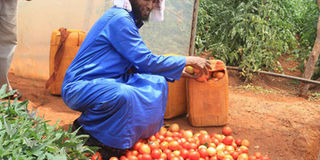Men groups in love with tomatoes and bees

Sharif Sheikh Dahir packs tomatoes after harvesting in Banisa, Mandera. The best variety of tomatoes to be cultivated in the area is the Tilka-F1, which is resistant to harsh conditions and needs little water and has a longer shelf-life, according to an expert in the area. PHOTO | MANASEH OTSIALO | NMG
What you need to know:
- The group started the project with almost no capital since all the materials needed were readily available.
- The honey combs are plucked using the hive tool or a knife and packed in the bucket before being lowered down.
- According to Deka, having the hives placed on the tall trees prevents the bees from attacking people and animals. It also keeps it safe from thieves.
- Charles Kyalo, a sub county agriculture officer in Banisa, singles out F1 hybrid tomato seed as the best since it survives the harsh conditions in Mandera.
Mandera is a vast county neighbouring Somalia to the East and Ethiopia to the North.
The men of the county, especially in Banisa constituency, understand the beauty of keeping bees and growing fruits and tomatoes. And they do it in groups.
One group, which comprises of 13 men and keeps bees, goes by the name Oginicho. “We started nearly two decades ago and to date, it has remained our main source of income,” says Abdi Hassan Deka, the chairman of the group.
The group started the project with almost no capital since all the materials needed were readily available.
At their apiary, the beehives can easily be seen hanging high up on tree branches.
The group harvests honey in two seasons, that is, between May and June and November and December.
“The harvest is high in the May/June season since it is immediately after long rains here the plants are flourishing therefore there is plenty of nectar,” says Deka.
To harvest the honey, the harvestor climbs the tree with a bucket, a smoker and the hive tool. The wooden smoker is lit once up and the hive is smoked to neutralise the bees.
The honey combs are plucked using the hive tool or a knife and packed in the bucket before being lowered down.
They sieve and pack the produce in three litre containers, some sold in Mandera and the bulk in Eastleigh, Nairobi, at between Sh1,800 and Sh2,000 wholesale.
Currently, the group has a total of 726 hives at the apiary and 600 of them are occupied. Every hive gives the group 10 litres of honey per season, with the group collecting at least 12,000 litres of honey every year.
Being in a group made it easier for the Mandera County government to support them by buying modern beehives.
According to Deka, having the hives placed on the tall trees prevents the bees from attacking people and animals. It also keeps it safe from thieves.
Charles Kyalo Kithuva, an agriculture officer in Mandera, says to trap bees into a new hive, a farmer needs to smear wax or propolis inside.
ABLE TO DIVERSIFY
“The scout bees will visit and assess the condition of the new hive before a colony arrives to settle. You need to get a good balance between light and shade. A bright apiary covered from direct sunlight works the best as bees are most active in such environment,” says Kithuva, adding farmers Langstroth hives ensure production.
Deka says they are working to expand their enterprise by making candles and wax from the honey combs so that we can earn more cash.

Two members of the Oginicho beekeepers group check on the hives in their apiary in Mandera. The group harvests honey in two seasons between May and June and November and December. PHOTO | MANASEH OTSIALO | NMG
Zahara Rashid, the county chief officer for livestock, says the farmers would benefit from a Sh4 million honey processing plant built in Banisa by the county government.
Not far from them is Golbo Omachu Farmers Association, a group of ten men engaged in fruits and vegetable farming.
Sharif Sheikh Dahir says they have been farming bananas, oranges, guavas, onions, watermelons, tomatoes, lemons and sweet potatoes since 2013.
“We have been growing tomatoes in the greenhouse since 2014 supplying all markets in Mandera County,” says Dahir, noting the structure cost them Sh250,000.
Charles Kyalo, a sub county agriculture officer in Banisa, singles out F1 hybrid tomato seed as the best since it survives the harsh conditions in Mandera.
“The best variety of tomatoes to be planted here is Tilka-F1 that is resistant to harsh conditions and needs little water and has a longer shelf-life,” Kyalo reveals.
The farmers get the seeds from Nairobi at a cost of Sh4,000 for a sachet of 1,000 seeds,” says Dahir, adding they make profits of up to Sh170,000 a season from their various groups.
The group sells a bucket of tomatoes weighing 10kg at Sh1,000 at the local markets.
“Good spacing in greenhouse production is a necessity for high yields in any farming of this kind,” says Kyalo.
He adds a well-spaced greenhouse allows easy weeding, spraying against insects and harvesting.
Dahir notes that they have been able to diversify due to the number of people in the group, since as one group take care of tomatoes, others tend to the other crops.





